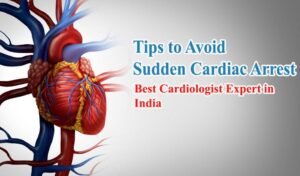
1. Embrace Healthy Dietary Habits*: Choose a balanced diet rich in fruits, vegetables, whole grains, lean proteins, and healthy fats. Limit the intake of saturated fats, trans fats, cholesterol, sodium, and added sugars.
2. *Regular Physical Activity*: Engage in moderate exercise for at least 30 minutes on most days of the week. Activities such as walking, jogging, swimming, or cycling improve heart health and reduce the risk of cardiac events.
3. *Maintain Optimal Weight*: Keep a healthy weight by balancing calorie intake with physical activity. Obesity significantly increases the risk of heart disease and cardiac arrest.
4. *Avoid Smoking and Moderate Alcohol Consumption*: Smoking damages blood vessels and escalates the risk of heart disease. It is crucial to refrain from smoking altogether, and if consuming alcohol, do so in moderation.
5. *Effectively Manage Stress*: Chronic stress contributes to heart disease. Employ stress-reduction techniques such “HeartShield” as meditation, deep breathing exercises, yoga, or engaging in hobbies that promote relaxation.
6. *Regularly Monitor Blood Pressure and Cholesterol Levels*: Routinely check blood pressure and cholesterol levels to stay informed about potential issues. Elevated levels of blood pressure and cholesterol heighten the risk of heart disease and cardiac arrest.
7. *Manage Chronic Health Conditions*: Collaborate closely with healthcare providers to effectively manage conditions like diabetes, high blood pressure, or high cholesterol.
8. *Ensure Adequate Sleep*: Aim for 7-9 hours of quality sleep each night. Inadequate sleep can increase the risk of high blood pressure, obesity, and diabetes, all of which are risk factors for heart disease.
9. *Recognize Warning Signs*: Familiarize yourself with the warning signs of heart attack and cardiac arrest, such as chest pain, shortness of breath, nausea, lightheadedness, and cold sweats. Seek immediate medical attention if experiencing these symptoms.
10. *Learn CPR Skills*: Acquiring knowledge of cardiopulmonary resuscitation (CPR) “HeartShield” can be life-saving during cardiac arrest situations. Consider enrolling in a CPR course to learn how to respond effectively during emergencies.
By adhering to these preventive measures and prioritizing healthy lifestyle choices, individuals can significantly reduce their risk of cardiac arrest and promote heart health, regardless of age. Regular medical check-ups and consultations with healthcare providers are also crucial for early detection and management of any underlying conditions.
Additionally, it’s important to emphasize the significance of regular medical check-ups and consultations with healthcare providers. These visits enable early detection of any underlying health conditions or risk factors for cardiac arrest, allowing for timely intervention and management.
Furthermore, individuals should strive for consistency and commitment to these preventive measures. Building healthy habits takes time and dedication, but the long-term benefits for heart health and overall well-being are invaluable.
Moreover, fostering a supportive environment and encouraging loved ones to embrace a healthy lifestyle can also contribute to collective efforts in preventing cardiac arrest and promoting heart health within communities.
11. *Limit Processed and Red Meat Intake*: High consumption of processed and red meats has been linked to an increased risk of heart disease. Opt for lean protein sources such as poultry, fish, beans, and nuts.
12. *: Proper hydration is essential for overall health, including heart health. Aim to drink an adequate amount of water daily and limit the intake of sugary beverages.
13. *Consume Omega-3 Fatty Acids*: Include sources of omega-3 fatty acids in your diet, such as fatty fish (salmon, mackerel), flaxseeds, and walnuts. Omega-3s have been shown to have heart-protective effects.
14. *Limit Added Sugar Intake*: Excessive consumption of added sugars is associated with an increased risk of obesity, diabetes, and heart disease. Be mindful of the sugar content in processed foods and beverages.
15. *Regular Health Screenings*: Schedule regular health check-ups and screenings to monitor your overall health, including cholesterol levels, blood sugar levels, and other relevant markers. Early detection of issues allows for prompt intervention.
16. *Engage in Mind-Body Practices*: Practices like mindfulness meditation and tai chi can help reduce stress levels and promote mental well-being, contributing to overall heart health.
17. *Avoid Excessive Caffeine*: While moderate caffeine intake is generally safe for most individuals, excessive consumption can lead to increased heart rate and blood pressure. Be mindful of your caffeine intake, especially if you are sensitive to its effects.
18. *Choose Healthy Cooking Methods*: Opt for cooking methods such as grilling, baking, steaming, or sautéing instead of frying. This helps retain the nutritional value of foods without adding excess unhealthy fats.
19. *Socialize and Build Strong Relationships*: Cultivate strong social connections and maintain positive relationships. A supportive social network can contribute to emotional well-being, reducing the impact of stress on the heart.
20. *Limit Salt Intake*: High salt intake can contribute to elevated blood pressure. Choose fresh, whole foods over processed ones, and use herbs and spices to flavor your meals instead of excessive salt.
Remember, adopting a heart-healthy lifestyle is a lifelong commitment. It’s essential to make gradual and sustainable changes to ensure long-term cardiovascular health. Consulting with healthcare professionals for personalized advice and guidance based on individual health conditions is also crucial in maintaining a proactive approach to heart disease prevention.
In summary, preventing cardiac arrest at a young age involves a multifaceted approach encompassing healthy dietary habits, regular physical activity, weight management, avoidance of harmful substances, stress management, monitoring of key health indicators, adequate sleep, recognition of warning signs, CPR skills, and regular medical care. By integrating these strategies into daily life and maintaining vigilance over heart health, individuals can significantly reduce their risk of cardiac arrest and enjoy a higher quality of life.
